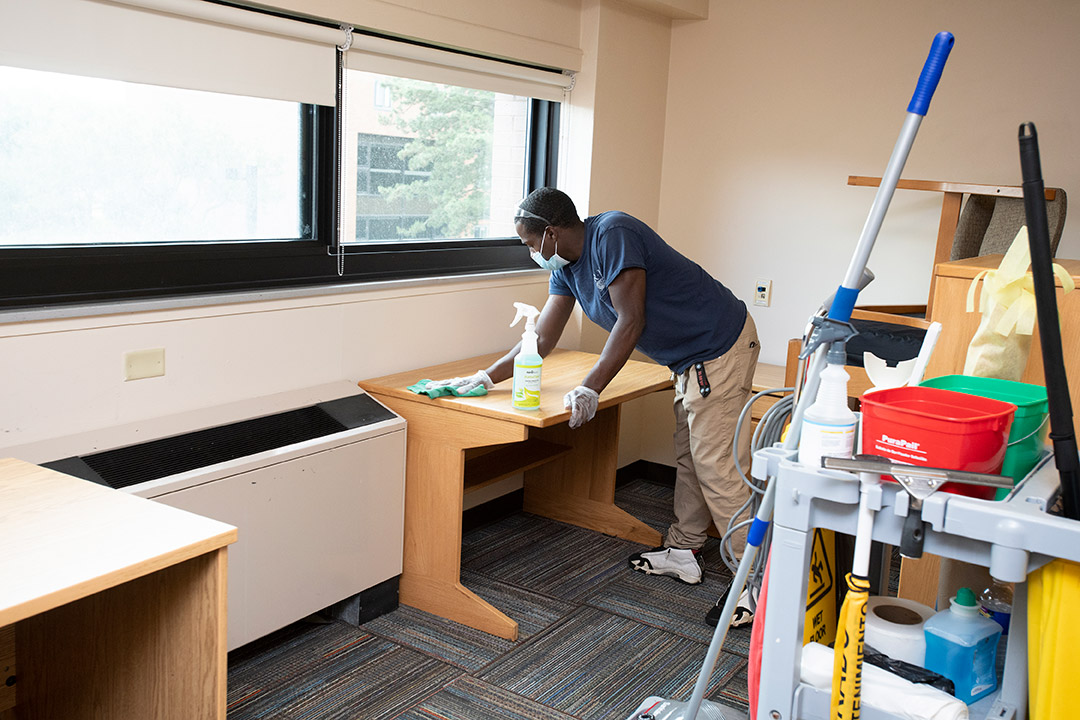Staggered move-in at RIT planned to promote safety
A. Sue Weisler
Zachery Avies from RIT’s Facilities Management Services cleans residence hall rooms and common areas in Mark Ellingson Hall in preparation for student move-in, which begins Aug. 12.
Mark Sternefeld of Montague, N.J., helped his sister, Marianna, move to Rochester Institute of Technology five years ago when she arrived to study software engineering. This year, he’s the first-year software engineering student, but the move-in process will be different with numerous COVID-19 precautions in place.
Mark Sternefeld.
“I’m very excited,” Sternefeld said. “I’ve been waiting for this for a long time. I’m pretty confident about what RIT has put in place to help keep us safe.”
Alex Hall, from Jefferson, Maine, will visit Rochester for the first time when he moves to RIT next month to study mechanical engineering.
“It’s going to be quite interesting,” he said. “I’ve taken virtual tours and have been involved in group chats. I’m very excited to come to RIT. It’s a whole new experience for me and it will open up so many opportunities in my life. It seems wonderful overall.”
They are just two of the approximately 2,900 new students who will be arriving at RIT over four days beginning Aug. 12, rather than on a single move-in day, which was the procedure in past years. All residence hall rooms are limited to two students and occupancy will be reduced in elevators to promote physical distancing.
“Every student does have to make an appointment time, both new incoming students, and returning students,” said Carla DiLella, executive director for RIT Housing. Students moving in will first meet in Parking Lot G, where they will check in and receive their key, as opposed to meeting at one of six staging areas as was done in past years. The only exception is the more than 260 students who will be living at the RIT Inn. Those students should report directly to that location at their scheduled appointment.
Alex Hall.
From Lot G, students will get directions to a parking area nearest their residence hall. Only one guest will be allowed into the drop zone and into the building with each student. If more than one person arrives with a student, the additional visitors will have to go elsewhere on campus and wait while the student gets settled.
DiLella said students will be allowed one hour to move in.
“Incoming students’ arrival times will be spread out over four days, allowing us to minimize the number of students moving in at any one time,” she said. “With this purposeful scheduling, students and their guest will have easier access to the elevators and stairs and less occupied hallways when moving in.”
And students are urged to be thoughtful about what they bring from home.
“We’re trying to highlight that students should pack really light and minimally,” DiLella said. “They will be here from August to mid-November, so we are asking them to pack just what they need for that short period of time.”
One new addition is a miniature refrigerator-freezer-microwave appliance in each room in residence halls and at the RIT Inn. This will enable students to stock up on meals and store and warm them in the convenience of their rooms without having to make multiple trips to dining areas. No other appliances to cook food are allowed.
To assist in move-in, wheeled carts and large bins, cleaned after each use, will be available, but students may bring their own to help move items from their cars to their rooms.
Returning students will move in from Aug. 16 to 18 using similar procedures. Carts will also be available at the various apartment areas on campus.
Scores of RIT administration and staff members have been preparing to safely welcome students back to campus, a massive undertaking due to frequent changes in what is known about the virus.
“We’ve needed to prepare for a lot of variables and uncertainties,” said Harold Fields, director of RIT’s Center for Residence Life. “One of the biggest challenges was not knowing what to expect. There have been many complexities we needed to identify and navigate in order to provide accommodations to students that will support their academic experience.”
Cleaning is also being stepped up, including twice daily in bathrooms, lobbies, elevators, and other contact areas. And bipolar ionization systems are being installed in residence halls, apartments, and academic buildings to help neutralize viruses, bacteria, allergens, mold, and other airborne contaminants.
Sternefeld will be driving to RIT from New Jersey with his parents, who plan to take turns helping him move into his room in the residence halls. He’s looking forward to meeting new people and experiencing new things, joining the Society of Software Engineering, Business and Technology Professionals, going to Tim Horton’s for coffee in the area and perhaps trying snowboarding for the first time.
“I’m thinking pretty positive and confident about everything,” he said. “I know it won’t be how my sister experienced things when she was there. I know it will be different, but it will be fun. I’m always up for experiencing new things. It will be an adventure.”
Hall plans to bring his chess set and a supply of snacks from home. He looks forward to moving into the residence halls, meeting his roommate, exploring the tunnels, and is curious to see how his classes will be set up.
“This is a new experience for everyone, and for RIT as well,” Hall said. “You’ve got to have a positive attitude. RIT is a strong community and we’ll make it through this together. We’re all here to support each other and to do our part to make sure we all stay safe.”
More information on housing is available on the RIT Ready website.
Packing lists
Lists of what to bring, for incoming students and returning students are available.
Recommended supplies to have on hand in case of illness:
- Disposable tissues
- Disposable gloves
- Hand sanitizer (at least 60 percent alcohol)
- Fluids such as tea, water, packets of Gatorade, packets of ramen noodles or chicken soup and juice.
- A disposable or digital thermometer
- Salt for salt water gargling for sore throat
- Honey—alone or mixed in tea for sore throat and coughs
- Acetaminophen (paracetamol, Tylenol) for fever and aches. Follow dosing guidelines carefully to avoid excessive amounts.
- Two-week supply of any chronic medications















